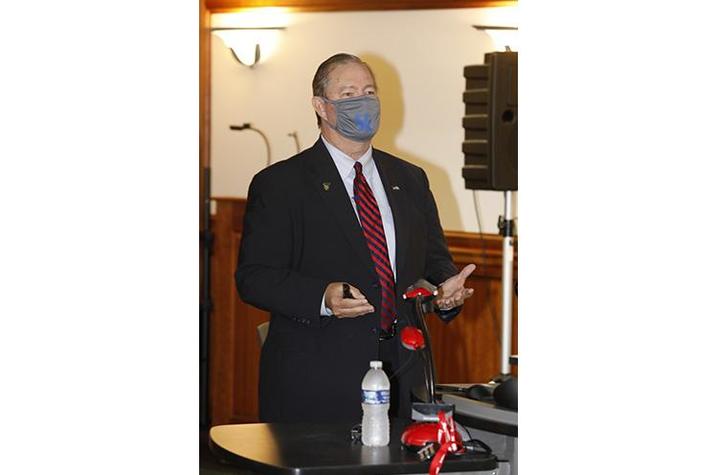UK Hosts Celebration of Land-grant Research

The University of Kentucky College of Agriculture, Food and Environment celebrated its land-grant heritage and mission and recognized some of its outstanding researchers during a recent ceremony.
Scott Hutchins, deputy under secretary for research, education and economics with the U.S. Department of Agriculture, was the event’s keynote speaker.
An entomologist, Hutchins’ research focused on integrated pest management. He joined the USDA after retiring from the private sector, where he served in various leadership and technical roles related to agricultural innovation and technology development. At the USDA, he leads the Agricultural Research Service (ARS), Economic Research Service, National Agricultural Statistics Service, the National Institute for Food and Agriculture and the Office of the Chief Scientist.
“We are honored to welcome Deputy Under Secretary Hutchins to campus to celebrate the legacy of land-grant research and engagement. As the heart of Kentucky’s land-grant mission and one of the original colleges at the Commonwealth’s flagship university, our legacy is evident through the work of our faculty, staff, students and agents who stand poised to lead on the agriculture innovation agenda outlined by Dr. Hutchins,” said Nancy Cox, UK vice president for land-grant engagement and dean of the College of Agriculture, Food and Environment. “The faculty recognized with research awards during the celebration are at the forefront of their respective fields and part of the world-class scholarship that continues to yield leading-edge solutions.”
During the celebration, Hutchins gave an overview of the USDA agencies he leads and talked of the importance of developing the next generation of scientists.
“The demand is higher in science, technology, engineering and mathematics fields than it’s ever been, and it’s only going to increase,” he said. “We need to identify, educate and develop folks to fill these important roles. Agriculture has demonstrated that it is high tech, high science and a great way for folks to make an impact on the world.”
He discussed USDA investments at UK including research studies in industrial hemp and a $66 million investment for a new Agricultural Research Service forage-animal lab. The lab will enhance the research conducted by ARS scientists in the Forage-Animal Research Production Unit, which is housed at UK. The building also will provide UK scientists with needed laboratory space to expand studies in animal sciences, plant sciences, hemp agronomics, fiber and bioreactive compounds and plant breeding.
“All of the things they are working on will address sustainable intensification or how we feed a growing population on fewer agricultural acres and in a way that does not diminish the soil, the air or the water,” Hutchins said.
In addition to the keynote address, the college recognized exemplary work completed by its researchers during the past two years.
“The College of Agriculture, Food and Environment at the University of Kentucky has some of the finest researchers at any land-grant university,” said Robert Houtz, associate dean for research and director of the Kentucky Agricultural Experiment Station. “Our researchers are widely recognized nationally and internationally for the innovative research and significant contributions they make to agriculture from both basic laboratory and field studies.”
The Bobby Pass Excellence in Grantsmanship is given in honor of the late Pass who served as the chair of the Department of Entomology from 1968-2001. The 2018 recipient is Nicholas Teets, assistant professor of entomology. Teets received the award for earning more than $2 million in funding for his research on how insects survive extreme environmental conditions, including insects living in Antarctica. The 2019 recipient is Alison Davis, professor in agricultural economics and director of the Community and Economic Development Initiative of Kentucky. Davis received the award for serving as the principal or co-principal investigator on 22 funded grants, totaling more than $14 million and for being recognized as an Interdisciplinary Research Leader by the Robert Wood Johnson Foundation.
The Research/Extension High Impact Award recognizes programs that have effectively communicated and integrated research into public outreach efforts. The 2018 recipients are Dawn Brewer, assistant professor in dietetics and human nutrition, and Bernhard Hennig, professor of nutrition and toxicology, for their programs offered through the Superfund Research Center’s Community Engagement Core. Carrie Knott, extension associate professor of plant and soil sciences, is the 2019 winner. Knott received the award for developing an applied research and extension program that helps Kentucky grain producers make better management decisions and for creating and leading integrated research and extension experiences for undergraduate students.
The Prestigious Paper Award recognizes scientists who have had their research published in a high-impact, peer reviewed journal. The 2018 recipient is Clare Rittschof, assistant professor of entomology, for her substantial contribution to the field of functional genomics pertaining to the study of bee behavior. Her research paper was published in Nature Communications. The 2019 recipient is Hongyan Zhu, professor in plant and soil sciences, for two papers on the cloning of the first legume genes that regulate nitrogen fixation efficiency. His papers were published in the Proceedings of the National Academies of Sciences.
The Thomas Poe Cooper Award was established by the late Cooper, a former dean of the college. The award recognizes a college scientist for a career of outstanding research. It is the highest honor the college gives for distinguished scientific accomplishments. Zhu is the 2018 recipient. Throughout his career, Zhu has contributed fundamental research that identifies the mechanisms involved in the interaction between plants and microbes. The 2019 recipient is Pradeep Kachroo, professor of plant pathology. During his career, Kachroo has identified several necessary components plants need to defend themselves against secondary diseases.
